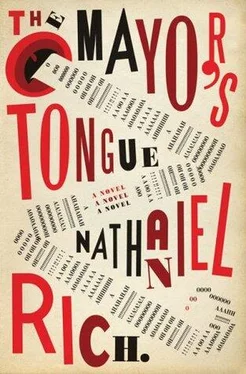"I was starving," he said. "I was just so. . ha-ha-hungry."
At that moment, everything changed. Rutherford dedicated himself to cooking, mixing heavy portions of crushed garlic with shrimp, mussels, and octopus, to create such dishes as gamberoni all'aglio, cozze all'aglio, and polipi veraci all'aglio. And he always saved the first bite for Private Schmitz.
"Not enough garlic," Private Schmitz said, after trying an early concoction: porca selvaggia all'aglio. Rutherford realized that Private Schmitz was not joking at all.
"My ideal eater," said Rutherford, his voice brimming with awe. And Private Schmitz, though he was confused, laughed and laughed, humoring his new friend. From then on, Private Schmitz was Rutherford's sous chef and favorite companion. When they were sent up to the mountains north of Trieste for rest and relaxation, to a small secluded country village called Ternova, they bunked together. At night, Rutherford organized dances in the local monastery, to which he would invite the local farmers' daughters, and introduced his friend Private Schmitz as a war hero. The fighter pilots grumbled at this favoritism, but not too loudly, since they did not want to lose their food.
After the armistice, the friends parted with faint promises to stay in touch, though neither had any idea what would happen to them beyond the next few months. Rutherford shipped off to visit cousins in Rome; Private Schmitz returned to Lancaster County and to Agnes. Soon afterward, under Agnes's influence, Mr. Schmitz took a job in Manhattan at Providential Insurance. About a year passed. Maybe three.
One day Mr. Schmitz received an overseas call from Rutherford. He had not heard from his friend since the war, and was beginning to suspect that he would never see him again. As it turned out, Rutherford had been living in high style, conducting his own postarmistice eating tour of vanquished Europe— Germany, Italy, France, and back up to England. Prices were dogcheap, and he had found out, through a friend in military intelligence, which great chefs had survived the war. He searched for them systematically, and learned that many of them would, in the postwar depression, prepare him a feast for a dime. In the same manner he sought out the best of the wine collections stored in bombproof cellars, and bought what had not yet been destroyed or chugged in desperation. Rutherford explained that he was now living in a rented room in Bari with his new girlfriend, a wild, black-haired Siciliana named Carlita Passamonte.
Hearing him talk about her, Mr. Schmitz thought Carlita sounded like something out of Rutherford's dreams — beautiful and loving but ultimately insubstantial, a collection of traits that seemed to reflect more about Rutherford's longings than they described a flesh-and-blood human being. But Mr. Schmitz didn't dwell on this — they spoke as if no time had passed, and he was excited to see that Rutherford still valued their friendship. When Rutherford asked him to visit, Mr. Schmitz agreed right away.
Mr. Schmitz alerted Agnes of his plans and left on a steamer for Southampton that week, with promises to write regularly. But once he was in Europe, Mr. Schmitz received Agnes's letters with a mixture of relief and irritation. He felt that even now, while he was abroad, Agnes pursued him as if he were her husband. When his responses dwindled, and his stay lengthened, Agnes's letters grew increasingly shrill. And her reach was long, extending as far as a wine cellar in the small grape-growing village of Langueville, just outside of Avignon. The cellar was not without historical significance — the vintner's family had safely hidden there during the raids of the Luftwaffe, drinking their stores to keep warm and insulated against their fear. Now Rutherford, Carlita, and Mr. Schmitz were helping them finish the wine that still remained.
It was while touring this wine cellar that Mr. Schmitz read the last letter he would receive from Agnes. He found the envelope folded in half in his jacket pocket. He had stuffed it there without reading it, and he had to look at the postmark to remind himself that he had picked it up at the post office in Ventimiglia ten days earlier.
The letter began with Agnes's usual account of her ordeals as a secretary in the office of a Newark congressman. She mentioned that her sister had left for her honeymoon — she gave him the address of their hotel in London, in case he happened to be in the area — and reported on the difficulties her mother was having with her varicose veins, which seemed ready to burst out of her calves. One page into the letter, however, Agnes broke off mid-sentence. She had skipped to the next line, where she wrote:
Oh Schmitz, I can't go on like this. It isn't fair. I don't know where you are and what you are doing. And if I don't know that, then how can we even pretend to carry on any kind of meaningful correspondence? You must let me know when you'll come back. If not, I will be forced to withdraw from this conversation. Indefinitely.
When I think about our relationship, in its current state, a funny thing happens. I start punching the wall. That's how I feel. So now you know.
The only kind of punch Mr. Schmitz had ever seen her make was a playful hand curl when she pretended to be mad — like when he teased her lightly and she would make a clown's frown, and press her little fists against his ribs, a disguised caress. The thought of her punching the wall, alone in her room at Miss Margaret's Boarding House for Women, disturbed him. Mr. Schmitz decided he would drive to Marseilles and fly home immediately.
He excused himself from the wine cellar and stood outside near the vineyard for several minutes, under a short cherry tree, trying to decide how he would break the news to Rutherford. The sky began to pale and yellow, and soon the mosquitoes were on him, raising bumps on his ankles and forearms. This more than anything else motivated him to return to the cellar and announce his decision.
But his path was blocked by Rutherford and Carlita, who had come up the stairs in a kind of blissful fog. Carlita was stunning in the dusk light — her skin olive and her hair hung flat and low to her shoulders like the drapes of an elegant house. When silent, she lapsed into forceful gazes that seemed to offer a challenge, but physically she was fragile, with small porcelain hips and long, wispy legs. She barely spoke, and whenever she did, it seemed as if she had been prompted by Rutherford. His arm was draped around her neck now, and they swayed into each other. Mr. Schmitz assumed they were drunk.
"Mr. Schmitz," said Rutherford, "Carlita and I have decided to be married."
Mr. Schmitz swatted at a mosquito that had perched on the bridge of his nose.
"Gliel'hai detto?" asked Carlita of her beau, for she could not speak a lick of English.
"Sì," responded Rutherford, with an uncomfortable smile. "Lui è troppo contento di parlare."
Rutherford grabbed Mr. Schmitz by the shoulder, and shook him.
"Did you hear, man?"
"Congratulations!" shouted Mr. Schmitz, more loudly than he intended. Rutherford and Carlita stepped back simultaneously. "And now?"
"Be our best man," said Rutherford. Mr. Schmitz never forgot how his friend looked in that moment — his chest puffed out, his eyes dazzling diamonds. "The vintner knows a priest in Avignon. And then join us, will you, on our honeymoon?"
"I'm delighted to be asked," said Mr. Schmitz, squeezing his chin. "Da-Dee-Dee-Delighted. But I couldn't impose like that. No, I think I'll take the opportunity to return home. I'm sure Agnes expects me."
"Ha!" said Rutherford. "I wouldn't think of it. Listen, we've talked this through and we can't think of a nicer way to celebrate our marriage than to continue our trip with you — to preserve the same fortuitous conditions that brought about our decision in the first place. Please stay. Besides."
Читать дальше












